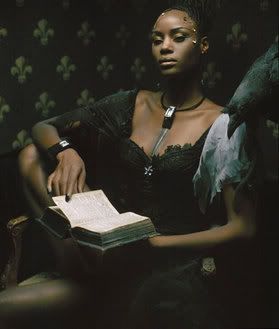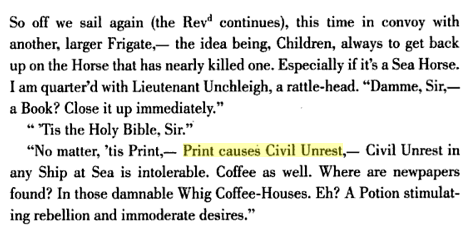 (image source, could easily be a representation of a certain character)
(image source, could easily be a representation of a certain character)
You would be forgiven for assuming that I had given up reading, based on this blog, as I haven't posted anything about books since May! I have been reading, though not at my usual rate, what with all the travelling and so forth. Also, to be honest, Mason & Dixon almost did me in. It's one of those, excellent-but-a-real-slog kind of books. You might recall, when it was last mentioned, I'd read 200 pages, a mere quarter of the book. I wrote:
 12. Mason and Dixon by Thomas Pynchon In which Mr. Pynchon's wild, Unfettered, Profound, tightly woven (and Sporadically, giving the Appearance, of Unhinged) Mind takes on the Lives of two Eighteenth Century English Astronomers, Servants of the Royal Society, now Best Rem'mbred for their Survey of of the Boundary of Pennsylvania and Maryland.... Though the language is suited to the protagonist's era (complete with unfathomable capitalization rules) and the narrative winding and non-linear, I'm 200 pages in and it's addictive. Only 600 more to go...
12. Mason and Dixon by Thomas Pynchon In which Mr. Pynchon's wild, Unfettered, Profound, tightly woven (and Sporadically, giving the Appearance, of Unhinged) Mind takes on the Lives of two Eighteenth Century English Astronomers, Servants of the Royal Society, now Best Rem'mbred for their Survey of of the Boundary of Pennsylvania and Maryland.... Though the language is suited to the protagonist's era (complete with unfathomable capitalization rules) and the narrative winding and non-linear, I'm 200 pages in and it's addictive. Only 600 more to go...
While less raucous than Gravity's Rainbow, it had level of detail and critical eye for history I've come to expect - both mentioning figures from the history of science like Bouguer, someone I would only expect geophysicists to know (and then, really, only those of us who work with potential fields methods, and I don't even expect anyone reading this to know what 'potential fields methods' means), and forcing me to reconsider my thoughts on General Wolfe. Dixon is identified as 'Geordie', and Wolfe's actions in Northern England, what today we would call union-busting, like his actions in Scotland (covered in the next novel I read) go beyond pragmatic into mercenary, despite the heroic image presented in Canadian history books. It does present an epic story just prior to and after the American Revolution (both George Washington and Benjamin Franklin appear as characters), but it is unflinching in detailing the violence including massacres of native people and the slave trade and its brutality, and the plight of women. Both Mason and Dixon are reminded of their time in South Africa, and are repulsed, the Quaker Dixon in particular. It wouldn't be Pynchon without the delightfully absurd Learnèd English Dog (L.E.D.), a chatty terrier, snooty pirates, the ghost of Mason's wife, sentient clocks (and Harrison's clock, of Longitude fame), a lovesick duck automaton chasing the object of her desire, a French master-chef through the woods, Jesuit plots and prostitute-nuns, a Chinese Jesuit Feng shui practitioner, serious coffee abuse, flying over leylines and a variety of magic accomplished through the magnetic and telluric fields of the earth, and the mysterious power of their surveyed line itself. It is epic, serious, absurd, and a touching tale of friendship between our odd couple, Mason and Dixon.
The excerpt is from PRINTERESTING, who were particularly amused by the "Print causes Civil Unrest". Perhaps that's my problem, I am both a printmaker and a coffee-drinker at sea.
13. No Great Mischief by Alistair MacLeod This is a novel of great beauty. I read it because RJH said it was one of his favorites; I am embarrassed to say I didn't know MacLeod (an amazing Canadian author) previously. The title brings us back to General Wolfe; it is a quotation from one of his letters arguing that Scottish Highlanders lead his troops into battle at the Plains of Abraham because, "they are hardy, intrepid, accustomed to a rough country, and no great mischief if they fall." It tells the story of the MacDonald family, through the eyes of Alexander MacDonald, now an orthodontist in Toronto. He recalls his childhood on Cape Breton Island, where he and his twin sister were raised by their grandparents, after a terrible accident on the ice, when his parents and brother were crossing to their lighthouse. It is also the story of his elder brothers, who grew up, half-wild in their ancestor and clan patriarch Calum Ruadh's home, and grow to be men who are expert miners, sent around the world, but longing for Cape Breton. It is the story of his grandparents, of the Island, of the entire mythic history of Clan Donald, of the Scots and their relationship with the French. Its characters are of such fullness and humanity that it is hard not to think this is a memoir, our narrator really knows and loves these people. Even the dog and horse worked their way into my heart. It's a love story about Cape Breton itself, but it also ties their exile to many who have to leave home, like the Mexican and Caribbean seasonal fruit pickers in Ontario, and it makes the story universal. It is about Home. Read it.
14. The Man That Corrupted Hadleyburg by Mark Twain. A dark and amusing little satire about pride, honesty, and small town politics.
15. Sugar & Other Stories by A.S. Byatt. Byatt's first collection of stories has a recurring theme of death and how the surviving cope. There are some ghosts; both children and parents haunt this collection. There is injustice. There is suicide, accidental death and one, possible, future homicide. It's a dark little collection, not as sweet as the name implies.
16. Women Who Run With the Wolves: Myths and Stories of the Wild Woman Archetype by Clarissa Pinkola Estés. Pinkola Estés is a Jungian analyst and storyteller. In this book about women's psychology, she approaches issues through the lens of fairytales and archetypes, employing stories and characters like Bluebeard, Baba Yaga, the Red Shoes and the Inuit Sealskin to provide insight. Each tale is interpreted as symbolic of a single female psyche; both Bluebeard and his bride, as well as her sisters are all aspects of a single mind. We have our own inner predators, but our own healers too. It's a style that is a bit foreign to me (I tend towards the literal and when in doubt, rely upon my logic and rational abilities) but I do love a good fairytale, and am certain there is both insight and sound advice within.
{Series so far: books read, more books read, books read, books read continues, more books read, I, II, III, IV, V, VI, VII, VIII, IX, X, XI, XII, XIII, XIV, XV, XVI, XVII, XVIII,XIX, XX, XXI, XXII, XXIII XXIV, XXV, XXVI, XXVII, XXVIII, XXIX, XXX, XXXI, XXXII, XXXIII, XXXIV, XXXV, XXXVI, XXXVII, XXXVIII, XXXIX, XL,XLI, XLII, XLIII,
XLIV,
XLV}









No comments:
Post a Comment